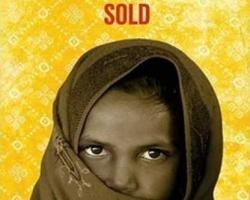Patricia McCormick
Hyperion Books, 2006, 263 pp., $8.99
Patricia McCormick explores the world of sex trafficking and uncovers the dirty truths about how the industry operates in her novel Sold. She writes her novel from the perspective of Lakshmi, a 13-year-old girl who lives in a poor village in Nepal. As the book progresses, McCormick utilizes this perspective to illustrate the raw emotions and hurt that abounds in the sex trafficking industry. She writes less from an intellectual standpoint, where she is trying to prove her points, but instead writes from an emotional and heart-driven style. As the reader continues to follow Lakshmi’s story, they are convicted and grieve over the pain and injustice.
The book title very accurately and succinctly captures the essence of the book. Without reading a single word, the reader can generally assume what the subject matter is and is not bogged down by an unnecessary or wordy title. In preparation to write this book, McCormick traveled to India and Nepal. She interviewed the women of the red-light districts and girls and women who have been rescued from sex trafficking. McCormick is a journalist who has also written books concerning war, the Khmer Rouge genocide and adolescent destructive behaviors, including cutting/self-injury. She stands out as an author well-equipped to write a book on sex trafficking.
McCormick writes her novel to reach audiences ranging from adults to middle schoolers. Because of the young ages she hopes to reach, McCormick’s language is easy to read and not overly technical. While the book is more than 260 pages, each page is double spaced, and the chapters are all about two pages long. Most of the pages are not filled with writing, so this book is very easy to work through quickly. There are no sections breaking up this book, but instead each chapter has a short title related to the content in it. Chapter titles such as “A Tin Roof,” “Fifty Days Without Rain,” “Police” “Gossip” succinctly explain what lies ahead for the reader.
The novel follows Lakshmi’s travels and as a result flows naturally. Lakshmi begins as a young girl who helps her mother around the house while her stepfather wastes their money. A monsoon brings terrible misfortune and poverty to their family, and Lakshmi is sold to a woman by her stepfather. This woman promises to give her a job in the city, while money will be sent back to her family. McCormick details Lakshmi’s journey through different handlers until she finally arrives at her brothel. The reader can easily detect Lakshmi’s horror as she realizes the true circumstances. The novel continues to portray Lakshmi’s life in the industry until she is rescued by aid workers.
McCormick has two main assertions throughout the novel. First, she attempts to display the absolutely terrible conditions with which women in sex trafficking deal. She also illustrates the dishonesty utilized by sex traffickers in their acquisition of women and children. McCormick does not use the traditional avenues of facts and statistics to raise awareness about the industry. Instead, McCormick appeals to the reader’s heart and emotions. Normally this strategy is weak and manipulative, but she is accurate in her details and does not treat the subject matter lightly. Because McCormick presents her points for the benefit of the women being sex trafficked and not for personal gain, an emotional support strategy works well.
The first assertion made by McCormick is well represented throughout the novel. Using Lakshmi as the narrator, McCormick can express the horrendous feelings and experiences the women in the sex trafficking industry experience. Lakshmi says that men “crush my bones with their weight. They split me open. Then they disappear.” Later in the book, as Lakshmi continues to grow numb, she expresses her inner anguish as she looks in a mirror: “Sometimes I see a girl who is growing into womanhood. Other days I see a girl growing old before her time. It doesn’t matter, of course. Because no one will ever want me now.” McCormick continues throughout the novel to illustrate the torment Lakshmi experiences as a representative of all the women in the industry.
McCormick’s other assertion is also well portrayed as Lakshmi’s time in the brothel continues. She reveals how the other girls in the brothel are brainwashed and utilized by the headmaster to brainwash Lakshmi. One of the girls lies to Lakshmi about the American aid workers who occasionally visit: “The Americans will try to trick you into running away, says Anita. Don’t be fooled. They will shame you and make you walk naked in the streets.” Ordinarily this kind of event is not portrayed when sex trafficking is being discussed. McCormick also illustrates another area of dishonesty in the industry. When the headmaster is discussing the money she paid for Lakshmi, she says, “And then there’s interest. You don’t think I gave this money to your family for nothing in return, do you?” The money these girls make never equals the amount they owe. McCormick demonstrates this horrible truth in a powerful and personal way.
This novel proves to be a very useful text for Christian ministry professionals. Regardless of the specific ministry, every person should be aware of the terrors of the sex industry beyond the basix facts. McCormick’s novel expresses the disgusting nature of sex trafficking in a deeply personal and impactful way. Youth pastors specifically will be able to use this novel with their teenagers because her points are clear and compelling and would benefit any reader.
Some other books readers of this text also would like include all of McCormick’s other works, especially Never Fall Down, the text concerning the Khmer Rouge. Other works include Slave: My True Story by Mende Nazer and Damien Lewis; Trafficked: The Diary of a Sex Slave by Sibel Hodge and Forgotten Girls: Stories of Hope and Courage by Kay Strom and Michelle Rickett.




